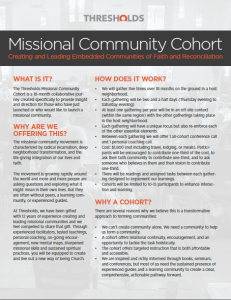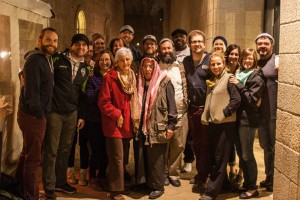 Having just gotten home from guiding another The Global Immersion Project Learning Community deep into the lives of the unheralded heroes in the Holy Land to learn from their often untold stories, I am processing emotions, thoughts and reflections that will soon bud into a renewed set of practices at home and abroad. I have now been to Israel/Palestine quite a few times and it would be easy to think the experience becomes mechanical or normal or whatever. Well, for me, that simply hasn’t been the case. We encourage our participants to enter the experience in the posture of a learner rather than a hero. I try to do the same, and in doing so, am continually convicted, challenged and inspired by our remarkable friends and peacemakers embedded within this conflict.
Having just gotten home from guiding another The Global Immersion Project Learning Community deep into the lives of the unheralded heroes in the Holy Land to learn from their often untold stories, I am processing emotions, thoughts and reflections that will soon bud into a renewed set of practices at home and abroad. I have now been to Israel/Palestine quite a few times and it would be easy to think the experience becomes mechanical or normal or whatever. Well, for me, that simply hasn’t been the case. We encourage our participants to enter the experience in the posture of a learner rather than a hero. I try to do the same, and in doing so, am continually convicted, challenged and inspired by our remarkable friends and peacemakers embedded within this conflict.
Here are 7 learning’s that have risen to the surface since landing back on home soil:
1. It’s About a Holy People, Not a Holy Land
There is no place on earth that has exploited human story and experience for the sake of a tourist “experience” more than in the Holy Land. Millions and MILLIONS of people go to the Holy Land each year seeking a holy experience, but fail to actually interact with the Holy People of the land. Now, I’m not saying a Holy Land pilgrimage is evil or bad. No, they are incredible and allow us to tangibly interact with central places and experiences central to our faith story. I’m a history/geography nut, so I totally get the value of this! But, and this is a big BUT, many of these tours inherently place the inhabitants of the land as tour guides in our “holy land experience” rather than seeing them as the very source of our holy land experience. It’s like going to Disneyland and as we run to each ride, our only encounter with the human staff is as they strap our seat belt around us before yet another emotional high.
Not only is this model of tourism unsustainable, it is unjust and insulates us from the realities of those living within Israel/Palestine. Bottom line, as followers of Jesus, is is our responsibility to turn our primary attention to the people of the land rather than to the land itself. Not only does this honor our brothers and sisters in the Holy Land, it creates the space for us to encounter not only the work God has done, but the work he is doing.
Note: There are more and more organizations that have identified the brokenness of the tourist industry in the Holy Land and are leading “ethical” tours in this region. In addition to TGIP, see Telos, MEJDI & even Rick Steve’s!
2. Forming Peacemakers is Hard
My primary role in leading these experiences is that of teacher and coach. Being a peacemaker does not equal picking a side and trying to get people to align with you. Firstly, no conflict is that dualistic and secondly, that would be far too easy. Being formed as a peacemaker is learning how to place yourself in the center of the pain and tension of conflict and highlight the humanity that exists within. It is about walking with people toward conflict transformatively rather than picking a side or running from the conflict all together.
As our participants see and experience the pain and injustice that exists in this region, there is a natural pull to pick sides and get really pissed off. The opposite extreme is to see the conflict, be so overwhelmed with its complexities and want to simply walk away. Neither option is the work of peacemaking and my (and my partner, Jer Swigart) work is to walk with people towards a more constructive place in their formation, which usually means confronting the evil within ourselves before confronting the evil around us. It is ridiculously difficult!!
3. Enemies Cease to be Enemies When You Look Them in the Eye
The Western world has become quite content with allowing sound bites and images to tell us who our “enemies” are. Without leaving the comfort of our own lazy boy chair, we talk and act as though we have a nuanced understanding of who is our friend or enemy. Not only is this unhelpful, it is does not allow us to see and celebrate the humanity we share with all of God’s children.
We spent an afternoon in conversation with one of the most “extreme” ideological and polarizing characters in the Israel/Palestine conflict. Although I disagreed not only with much of WHAT he had to say, but HOW he chose to say it, I was struck by his humanity. He’s just another guy like me who deeply believes in his cause and those impacted by it. At the end of our conversation, I thanked him for his time, congratulated him on his newest grandchildren (We’re friends on Facebook, so I was in the know!) and gave him a hug. All the rhetoric and posturing went out the door and we saw each other as fellow humans. It’s really hard to have “enemies” when you look them in the eye.
4. Choosing Non-violence Doesn’t Equal the Avoidance of Bloodshed.
It absolutely bends my brain when I hear arguments that choosing non-violence in the face of violent conflict is somehow soft or weak. As we learned from peacemaker after peacemaker who is faithfully choosing to face violence with creative acts that subvert and disarm systemic violence and war-making, I was both inspired and convicted. It was inspiring in that it was in these stories that the story of Jesus was BY FAR the most tangible and real. It was convicting in that I was confronted with my own tendency toward violence. I want to live the Jesus way that calls me to set down my weapons and pick up my cross, but it is hard. It is scary. And to be honest, it doesn’t always “work.” In other words, non-violence doesn’t equal the avoidance of bloodshed. Like Jesus, rather than it being my “enemies” blood, it would be mine. I suppose that is why I’m convinced the work of peacemaking is not only a way of life, it is discipleship.
5. Violent Conflict is Very Real, but We Choose How We Engage It
We intentionally go to the center of this often volatile conflict because it is the best classroom, filled with the best instructors for the things that make for peace. Sometimes the conflict feels a bit far off from everyday life both in Israel and in the West Bank, but on this trip, it became more real that ever. There were three different instances where protests, clashes and violence unfolded within steps of us. It culminated with our hotel being hit by tear gas canisters and tanks rolling through the road at the bottom of our steps.
As these incidents unfolded, I was stuck by the reality of violence AND the very tangible choice we have in how to engage it. Again, not an easy choice, but a certainly a choice in our discipleship journey.
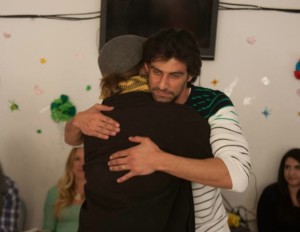 6. Brotherhood Has Nothing to do with Borders
6. Brotherhood Has Nothing to do with Borders
While with our dear friends at the House of Hope in Bethany (in the West Bank), Jer and I were given what could be the most moving “award” I have ever received. We were honored as “Brothers for Peace” and given a plaque that read:
“For being ambassadors for Christ, passionate peace builders, and partners in building bridges…reviving hope…and making the future…”
I could have never imagined a reality in my life where I would consider one of my dearest friends to be a person who lives half way across the globe in a reality and culture that is 180 degree different than my own. But, I am glad to say that reality has come true with my friend Milad, a Christian Palestinian who has given his life for peace in the midst of a reality that knows very little of peace. This is not a one way relationship where I simply go to “serve” him. No, he often “serves” and teaches me far more of what it means to follow Jesus than I teach him. It is a genuine, mutually edifying friendship. It’s crazy the types of experience and relationships you build when you follow Jesus into the places you’ve been called. What a gift.
7. When the Church Embraces Her Vocation as an Instrument of Peace in the World, Wrong Things Will Begin to be Made Right.
It is both terrifying and convicting hearing from person after person living in the Holy Land (Israeli and Palestinian) how much of an impact the American Church has on the continuation or the resolution of the current conflict between Israel & Palestine. They, very tangibly, feel the impact of our theology and politics being played out on their streets, in their homes and shaping the future of their children. Whether we like it or not, this is the reality and we have to take it seriously. For too long (about 100 years specific to our engagement in this region), the Church has given more allegiance to war making and nationalism that it has to the Kingdom of God and the Way of the Cross. Thankfully, the tide is turning and our friends in the Holy Land are celebrating our realignment with peacemaking and reconciliation as is central to the Mission of God and embodied in the life and teachings of Jesus
I’m a more convicted than ever that the Way of Jesus, and the Church as an embodied manifestation of this Way, is the most constructive way to bring about peace in the world. In other words, when the Church embraces her vocation as an instrument of peace, wrong things will begin to be made right in the world. What an honor to be part of and worthy cause to give our lives to!
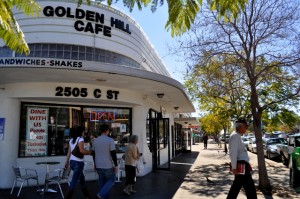 I recently looked out my front door and saw a woman sitting on the stairs of my patio. She was out of breath, sweaty and had a large basket next to her full of cans and plastic bottles to be recycled. She looked desperately in need of some rest and refreshment. I’m pretty good at ignoring people in need (sadly), but when they come to your physical doorstep, I couldn’t imagine not stepping outside to check on this woman.
I recently looked out my front door and saw a woman sitting on the stairs of my patio. She was out of breath, sweaty and had a large basket next to her full of cans and plastic bottles to be recycled. She looked desperately in need of some rest and refreshment. I’m pretty good at ignoring people in need (sadly), but when they come to your physical doorstep, I couldn’t imagine not stepping outside to check on this woman. 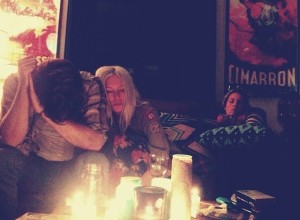 It has been a tough go for the Church in the United States over the past couple months. The name calling, division and posturing reached a deafening volume last week in the wake of the World Vision controversy around employing those in gay marriage.
It has been a tough go for the Church in the United States over the past couple months. The name calling, division and posturing reached a deafening volume last week in the wake of the World Vision controversy around employing those in gay marriage. 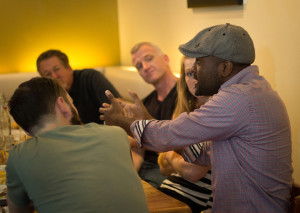 We are thrilled to announce the launch of our newest The Global Immersion Project initiative called, Cultivate: An Everyday Peacemaking Intensive. These one-day events will be hosted at cities across the US and are our first Cultivate event is set for Seattle on April 24 in conjunction with the
We are thrilled to announce the launch of our newest The Global Immersion Project initiative called, Cultivate: An Everyday Peacemaking Intensive. These one-day events will be hosted at cities across the US and are our first Cultivate event is set for Seattle on April 24 in conjunction with the Having just gotten home from guiding another
Having just gotten home from guiding another  6. Brotherhood Has Nothing to do with Borders
6. Brotherhood Has Nothing to do with Borders